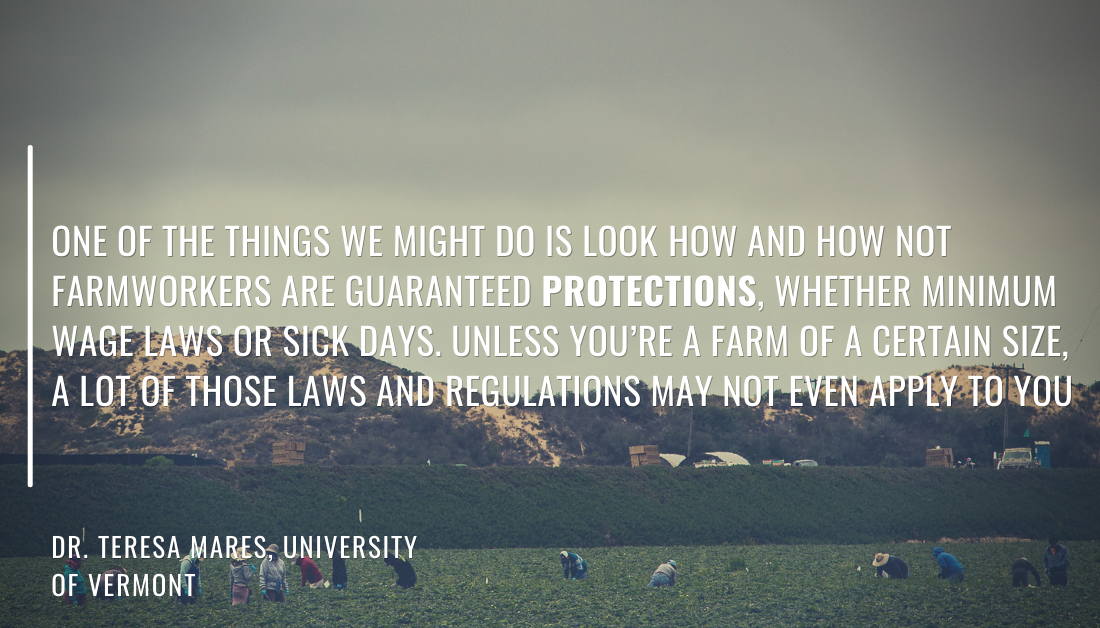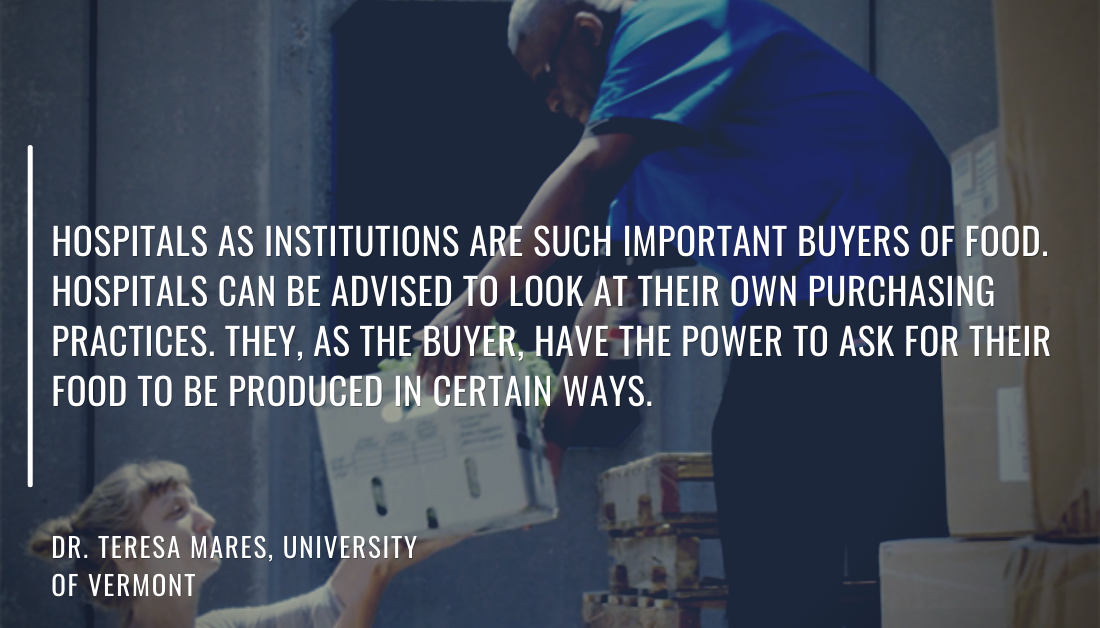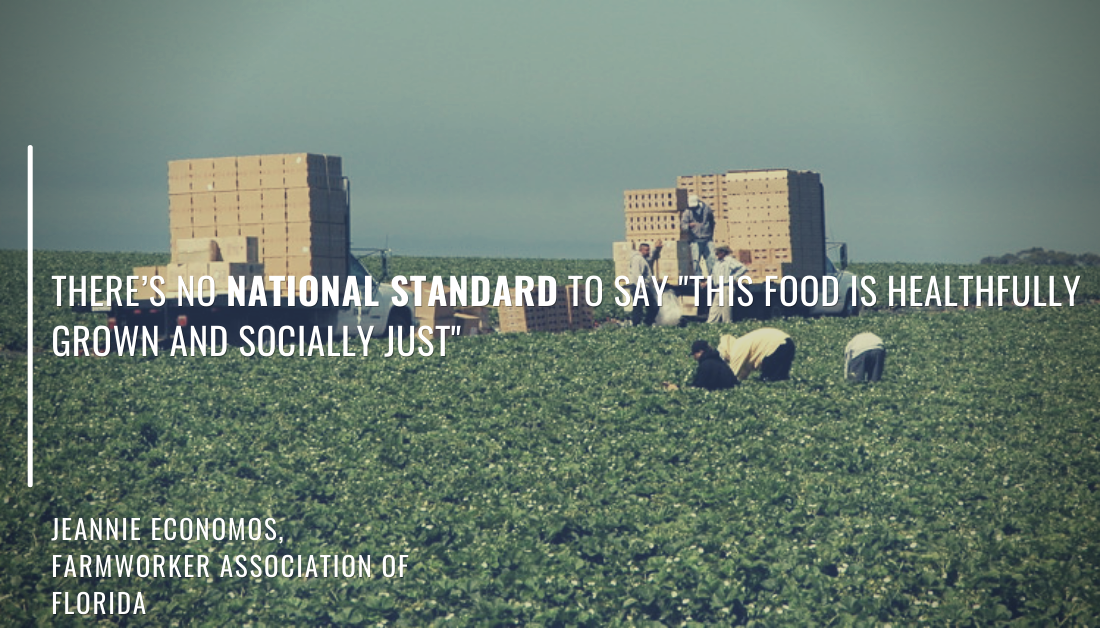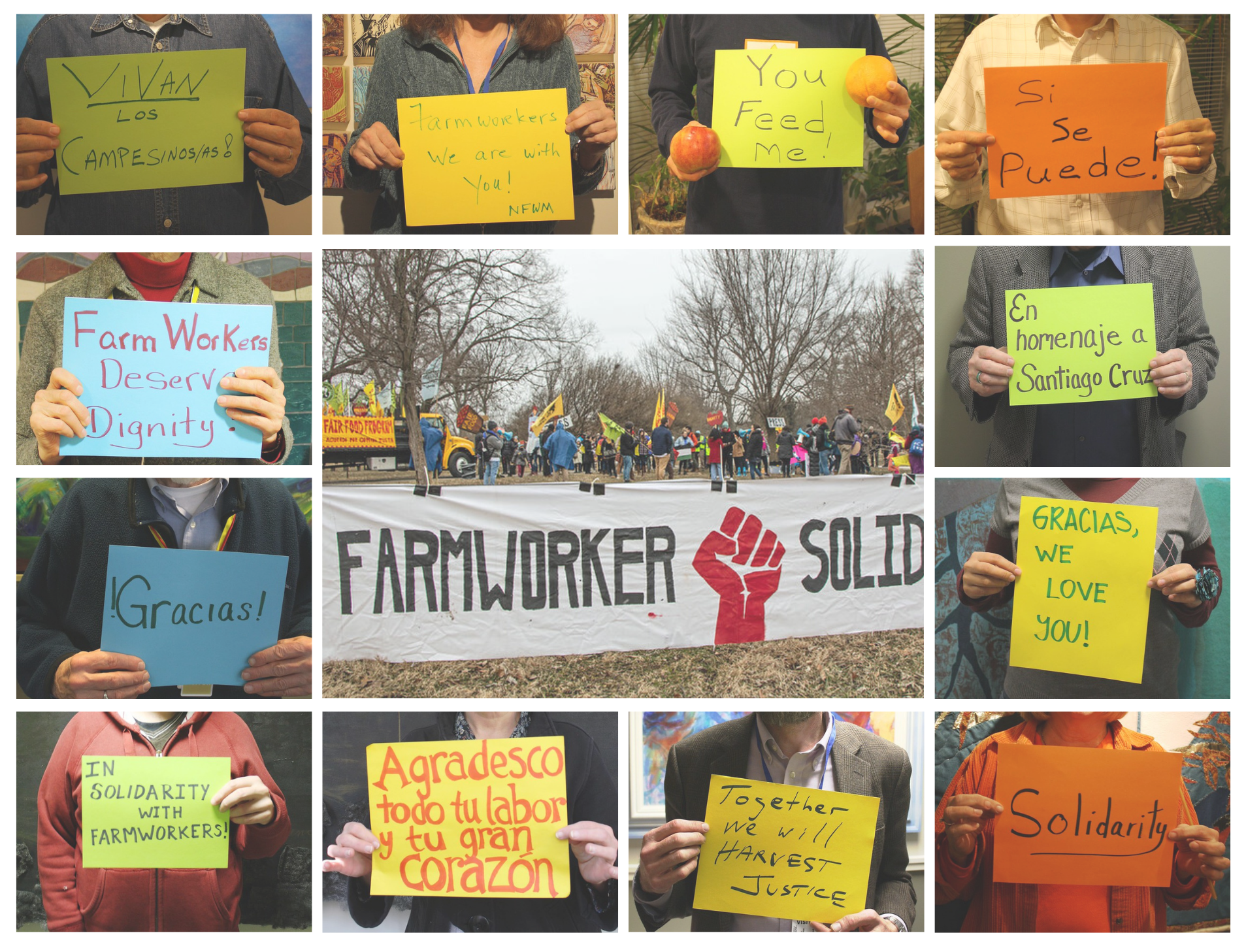Ethical food purchasing
Health care’s role in protecting workers
A Health Care Without Harm position statement
Health care can play a critical role in protecting workers, community health, and the planet through procurement and advocacy.
Hospitals and other health care institutions are embracing their mission to heal, going beyond the Hippocratic Oath to promote health and resilience in their communities and mitigate inequities. They are increasingly taking into account social, economic, and physical determinants of health.
Ready to improve your procurement?
Check out our resources:
In a globalized world, hospitals have the opportunity to impact the communities involved in their supply chains through their purchasing choices. This includes all the farmers and farmworkers who supply food to hospitals – those local to their communities and regions and those from different parts of the world. Institutional procurement and related strategies focused on a valued workforce ensures that all food workers, from farm to cafeteria, are provided a dignified livelihood and are empowered to advocate on behalf of themselves, without fear of reprisal.
Lived experience of farmworkers

Workers in a farm field along California State Route 1 in Nipomo, Calif. (Tony Webster/Flickr)
There is a stark difference between the laws and the lived realities of farmworkers, a gap that leaves farmworkers vulnerable to abuse and poor health. Individuals who work in the food chain – from harvesting to processing and beyond – have some of the most dangerous jobs in the country. For example, animal production and aquaculture workers have nearly twice the incidence of nonfatal occupational injuries than the national average. The dangers of these jobs are not confined to work.
Federal and state laws mandate certain protections for farmworkers, but they vary by business size and lack enforcement.
These legal protections include:
- Housing must meet local and federal standards.
- Employers must comply with the terms set out at recruitment and a federal minimum wage standard.
- Federal Worker Protection Standards require personal protective equipment for farmworkers handling pesticides and other hazardous materials.
- Farmworkers have legal protections from sexual violence, including sexual assault and rape, and sexual harassment, though harassment may not carry criminal charges.
Federal and state legal standards can all but disappear on farms, where oversight is minimal and the potential for abuse is ubiquitous. Undocumented immigrant farmworkers, who make up between 50 to 70% of the farmworker labor force in the United States, are particularly vulnerable as they can be turned over to Immigration and Customs Enforcement should they choose to report abuse.
The 2020 COVID-19 pandemic both exacerbated unsafe working conditions for farmworkers and called attention to their health and safety concerns. Many farmworkers faced increased demand as essential workers but were not provided personal protective equipment, social distancing measures, and other basic protections. In 2020, communities with meat processing plants that had received the above waivers saw county-level COVID-19 rates almost twice as high as those with meat processing plants whose line speed followed the safety policy as written.
These problems did not just appear during the pandemic. Rather they have long been a part of the food supply chain.
Meat processing plants consistently applied for – and were awarded – waivers to policies designed to protect workers. Regulations control the speed of production lines, but waivers allow companies to increase the number of processed animals per minute beyond the limit that is determined safe for workers.
Dairy farms have been known to bring veterinarians from Mexico to work as animal scientists and instead put them to work for grueling 12-hour shifts without breaks to milk cows, clean manure, and carry sacks of feed.
Migrant workers in Missouri with H-2A visas, which allow foreign nationals to fill temporary agricultural jobs in the United States, were forced to work in dangerously hot weather with little water and were provided living spaces that were cramped and dirty, with bedbugs and leaking toilets.
Black veterans were allegedly targeted in Florida, brought to a farm, hooked on drugs, and forced to work to pay off exorbitant debts.
Approximately 80% of female Mexican immigrant farmworkers have been sexually harassed in the fields.
Third-party certifications, which hold farmers and producers to higher standards than may be legally required and involve independent audits, can be an important first step in closing that gap and ensuring that food systems provide for the health of the workers, environment, and communities.
Considerations

Screenshot of "Caring for our communities" video showing local purchasing by hospitals (Healthcare Anchor Network)
The following considerations can inform your hospital procurement practices and allow your facility to utilize their influence and economic power to make a difference.
Farmworker health and safety
Farm work is some of the most dangerous labor being done – the heavy machinery, large animals, fast, monotonous movements, and weather and chemical exposure create an environment that puts farmworkers at risk for injury and disease. Because of the social, political, and legal situations that place many farmworker communities in positions of vulnerability, farms can be the first stopgap in a chain that is rife with injury and disease.
“Repetitive stress injuries, quite a bit of ergonomic related issues, exposure to cleaning chemicals, depression and anxiety, gastrointestinal problems are some of the main health concerns reported by farmworkers in the dairy industry.” – Dr. Teresa Mares, University of Vermont
To truly protect the well-being of farmworkers, hospitals should look for farms with standards in place that focus on the safety and health of farmworkers, including fair wages, bans on retaliation for reporting abuse, bans on discrimination, a safe work environment, days off, prevention of pesticide exposure, and limits on sun exposure. Individual health and safety also encompasses the banning of child or slave labor, including indentured or otherwise oppressive and abusive practices. Seeking out products that carry third-party verified labor and agriculture certifications that meet and ensure these criteria is a way for hospitals to continue to utilize their influence and economic power to create protections on the job and support worker livelihoods beyond typical industry practices.
Social and economic determinants of health
While there are a growing number of initiatives to address social and economic determinants of health in the general population, the basic labor rights of farmworkers continue to be unaddressed. In the United States alone, there are more than four million workers involved in farming and food production, which includes harvesting and the processing of produce, meat, poultry, and seafood. Although this is a population that is difficult to study due to the conditions of their immigration status or work requirements, numerous studies have found farmworkers to have increased levels of cancer, likely due to pesticide and sun exposure. Pesticide exposure is also implicated in Alzheimer’s and Parkinson’s diseases, as well as various disorders of respiratory and reproductive tracts. Farmworkers often live in farm properties and rely on the employer to provide adequate living conditions. Many of these workers are not paid livable wages, work in hazardous conditions, are excluded from certain labor law protections, and face discrimination. These working conditions further exacerbate health disparities. Agriculture workers face the highest rates of both fatal and non-fatal work-related injuries among workers overall (including construction and mining workers). However, only 25% of costs related to these injuries are covered by employment compensation, while only 22% of farmworkers report having health insurance.
Resilient communities

Workers harvest strawberries in Salinas Valley, Calif. (Nathan Walls/Flicker)
The planet is approaching the precipice of ecological and socioeconomic crises. The Earth’s temperature is increasing and weather patterns are becoming more volatile and less predictable. Meanwhile, accelerating global inequality continues to widen the gaps between the rich and the poor. "Community resilience” is the concept that refers to when a social system can withstand pressures from a variety of exogenous events or systematic challenges. It banks on the creation of strong social capital foundations and resilient farming practices, ranging from collective bargaining rights to crop rotation. Health Care Without Harm defines resilience as follows:
“The ability of a community/society to survive as a species and to sustainably meet its basic needs within limits of the larger ecosystem. Resilience is the capacity to prepare for, withstand and recover from acute and chronic adversity and emerge stronger than ever.”
An important criteria for certification programs and attributes that address fair labor practices is that they are worker-led and empower workers to advocate for their needs in the workplace with access to mechanisms that are endowed with tangible enforcement power strong enough to achieve accountability for noncompliance from farm owners and operators. Workers are the ones who are best positioned to know what protections need to be in place, and the standards needed to uplift existing structures of inequality. Good examples of worker-driven social responsibility programs are the Fair Food Program and Milk With Dignity, both of which involve workers in standard-setting, monitoring and enforcement. Additionally, collective bargaining agreements through which workers have access to remedies fit for the purpose of effectively protecting their rights is an important component of these programs.
Health care can play a role in building community resilience and supporting worker livelihoods by:
- Endorsing sustainable food, labor, and agricultural practices through their procurement and advocacy activities.
- Creating trust and goodwill with communities by purchasing locally, supporting the local economy, and highlighting ways that you've worked to support local farm workers.
- Democratizing relationships with communities and community organizations, by working to change discriminatory structures of power, and by supporting socioeconomic growth in the communities they serve.
- Supporting farmers and suppliers that provide fair pay and conditions to workers (including health and safety programs), provide medical insurance, support collective bargaining, reduce waste, maximize resources, and use agriculturally and ecologically sound practices.
- Working with your organization to develop and implement comprehensive institutional policy(ies) that address and support the rights of workers and ensure that all food workers are provided a dignified livelihood, the right to organize, safe and healthy working conditions, and living wages.
- For example, you can include the protection of worker rights as criteria for determining vendor responsibility via the procurement process and in new solicitations and contracts.
- Working with your organization to set direct and contracted food worker wages at your institution at a local living wage.
Take action
 Supporters show their appreciation for farmworkers on behalf of the National Farmer Workers Ministry in 2011 (NFWF/Flickr); Farmworkers from Immokalee, Florida joined students and staff at Ohio State University in Columbus demanding fast food restaurants take human rights into the cost of their meals (Becker1999/Flickr).
Supporters show their appreciation for farmworkers on behalf of the National Farmer Workers Ministry in 2011 (NFWF/Flickr); Farmworkers from Immokalee, Florida joined students and staff at Ohio State University in Columbus demanding fast food restaurants take human rights into the cost of their meals (Becker1999/Flickr).
- Learn: For more information on a holistic vision of racial equity in the food system, Race Forward’s report, “Building the Case for Racial Equity in the Food System,” gives an essential overview. Although this paper does not specifically endorse certifications, the Coalition of Immokalee Workers has been on the front lines of advocating for agricultural workers in the United States. Their certification, Fair Food Program, has a series of reports that shed light on a variety of labor issues in the food systems. Additionally, the Fair World Project’s 2020 International Guide to Fair Trade Labels offers a comprehensive overview of the issues at stake in fair trade labeling and analyzes the fair trade standards across various programs and the work that is needed to improve and strengthen each of these labels and certification programs.
- Purchase: Follow the purchasing guidance in Practice Greenhealth’s healthier food purchasing standards for programs and certifications accepted under a valued workforce to ensure you are purchasing fair food that supports workers' health and safety
- Communicate: If your distributors do not offer products sold under these standards, express to them that you are looking to increase your values-based purchasing to include products that come from a more equitable food system. What we’ve learned from local and sustainable food purchasing initiatives is that distributors often need to know there is a purchaser before bringing products into their trucks. If you are purchasing directly from local or regional producers, make it a standard practice to ask them about their labor practices. We have developed a list of potential questions to help guide you in this endeavor.
Thanks
Health Care Without Harm thanks the team of researchers from Mark Bittman’s course at the Mailman School of Public Health at Columbia University, who contributed to the development of [title]. Anthony J. Cangelosi Jr., Qëndresa Krasniqi, and Margaret M. Palmer provided foundational information and framing for this position statement.
